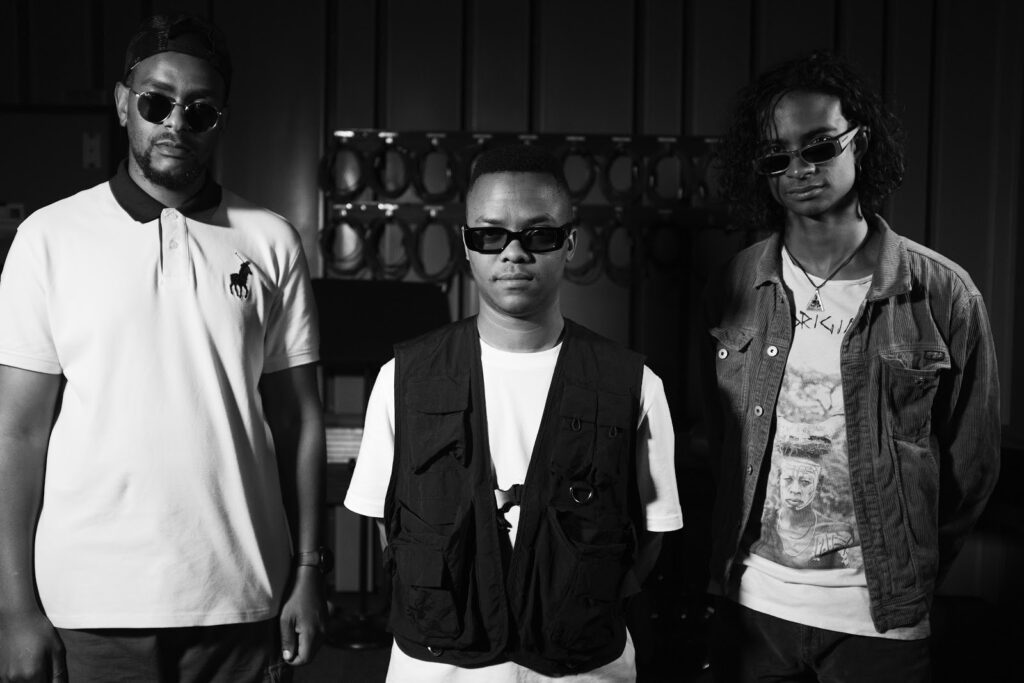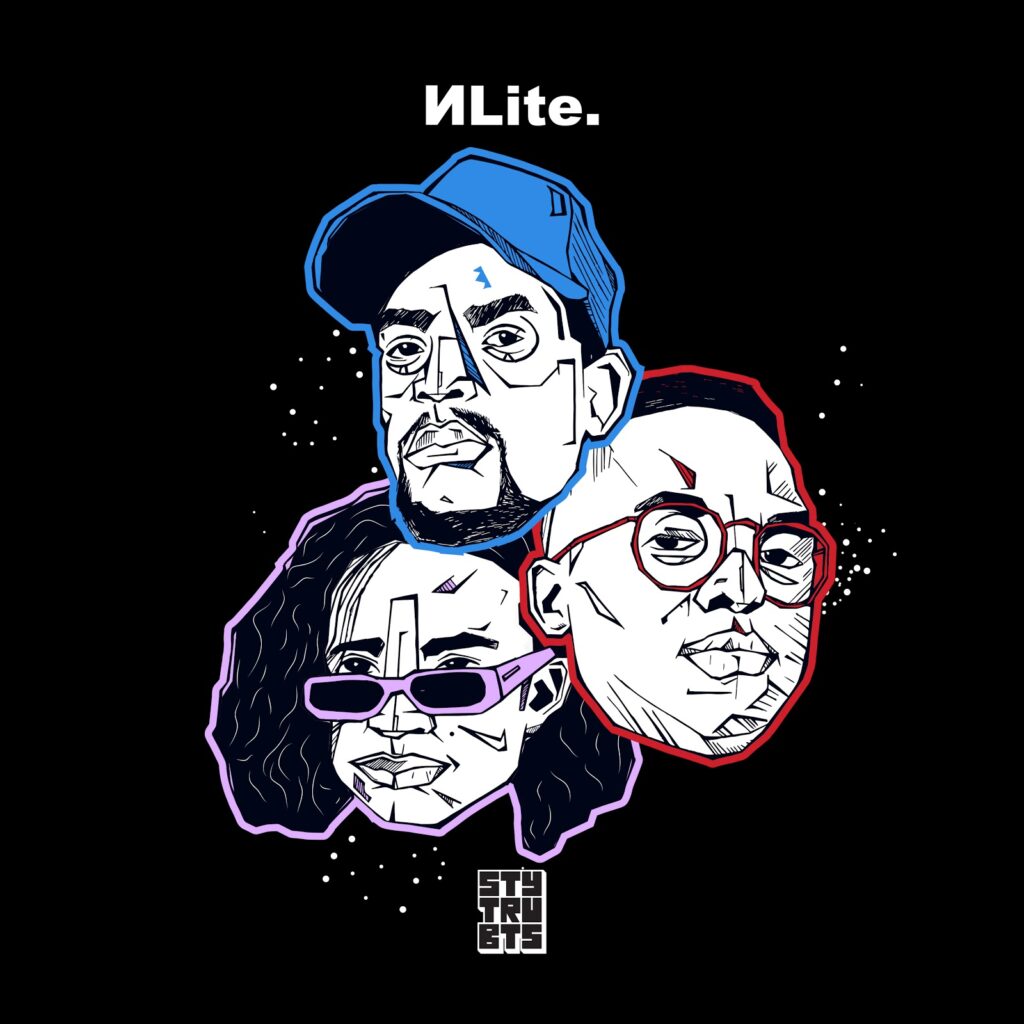Trumpeter Robin Fassie (centre) is also a hands-on producer and tends towards sparse use of his instrument on the album. (Photo: Earl Abrahams)
‘Organic’ is a word that comes up a lot when NLite discuss the musical choices made in their self-titled debut album, released on STY TRU BTS near the end of September. Also “meditative” and “spontaneous truth”.
The first, offered up frequently by group member and trumpeter Robin Fassie (RFKoncept), would refer more to the formation of the group, following two years of jamming together and running into each other in the country’s various jazz scenes. “Meditative” is how beatmaker, producer and former Orbit soundman Daev Martian describes the sound of the group.
By “spontaneous truth”, Chenoa Nwokedi (Crunchy Sweater) is probably describing the off-hand lyrics and musicality of Daev Martian alongside guests such as ASAP Shembe, Mr Kudakwashe and Sio.
Considered as a whole, the band’s sound is a combination of Daev’s aquatic beats, Fassie’s airy approach to the trumpet (and his newfound love for producing), along with Nwokedi’s “crunchy” bass playing.
“In the studio I’m hands-on when it comes to the arrangement of the songs,” says Fassie, as if accounting for the sparse use of trumpet throughout the album. “It’s funny because whenever I was adding trumpet to the album, I always felt as if I was adding too much, and the guys always say, ‘No, it’s just enough, leave it like that’. But then I’m like, ‘Nah, let me just take it out.’ ”
 Daev Martian, Robin Fassie and Chenoa Nwokedi formed NLite after two years of jamming together. (Photo: Earl Abrahams)
Daev Martian, Robin Fassie and Chenoa Nwokedi formed NLite after two years of jamming together. (Photo: Earl Abrahams)
While fulfilling Daev’s ambitions of being in a band, and Nwokedi’s wishes to be more than a session musician, NLite is also an outlet for Fassie’s long fascination with electronic music, which was all around him even as he first picked up the trumpet in grade 10.
“There is a song I produced on my own there called Get Widit [featuring Dilla-like jet-lagged drums]. In terms of what I bring to NLite, it’s the same as everyone, but I would say the other guys in the band are lazier with arranging.”
It fosters growth as a unit when the system is built around a budding friendship as opposed to around session musicians. Fassie is a staple in the jazz scene having worked with contemporaries Nduduzo Makhathini, Bokani Dyer (who composed the song The Artist especially for him) and Shane Cooper.
He says he turned to Daev (and YouTube) when it came to learning in the ins and outs of producing. “I’d say Daev is heavily influenced by Flying Lotus, myself as well, I like Thundercat, Christian Scott and all these modern guys who are breaking new territory musically; Robert Glasper as well.”
Production-wise, says Fassie, the group does not go into the process with a specific sound in mind. While the sound is propelled by beats, giving it a vital, youthful feel, it is balanced by a sense of supple musicality. It also has fascinating quirks, like Sio’s barely legible performance on Between Realms, which sees the vocalist sounding like a string instrument and Daev’s distorted sermon in Get Widit, apparently meant to get sleepers on par with the new programme.
“I was first rapping, then I started producing, then I realised I can’t produce without learning how to play keys, so I started learning piano anyway I could,” says Daev. “I’d link up with guys who knew how to play. By the time I met Chenoa, my intention was just to jam.”
Nwokedi adds an interesting dimension to the group, as a bass guitarist who relies on his acoustic guitar skills as a base to create. He says: “I have the option of melody, bass and chords and I love having that at my fingertips.”
 NLite is released by STY TRU BTS, a label run by DJ and producer Kid Fonque
NLite is released by STY TRU BTS, a label run by DJ and producer Kid Fonque
Perhaps in an effort to synthesise his mate’s style, the coaching from Fassie to Nwokedi’s in-studio approach has been to “sing what’s in your head and make that happen”, a maxim borrowed from Miles Davis.
Incidentally, Daev and Nwokedi began solidifying their musical ideas before Fassie joined. On one of their first sessions together, they jammed to Red Clay by Cleo Sol. “It’s originally a Freddie Hubbard song,” says Nwokedi. “We also played a lot of other stuff, but that’s the one that stays with me.”
The texture of Red Clay, a song famously sped up and sampled by A Tribe Called Quest for the song Sucka Nigga, is traceable in the album’s more laid-back moments, suggesting that the group’s musical possibilities are endless, should their bond be given a bit more time to congeal.
Teaming up with STY TRU BTS, a beat-driven label associated with Kid Fonque’s Stay Tru Sounds (under which Daev Martian has put out the EPs Umoya and Endomorph), suggests that the group may just have the creative freedom to expand their horizons.
“It’s been a safe space to be experimental and still be Daev Martian,” says the producer. “What’s different is me being me bringing my homies into that space; that competition creates something different. I’m also able to explore other avenues like rapping while they focus on mixing and mastering or visuals. We’re all interchangeably around this whole machine.”
NLite is available on all digital platforms